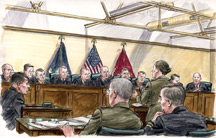Navy-Marine Corps Court of Criminal Appeals (NMCCA) History

The Uniform Code of Military Justice (UCMJ) was enacted by the U.S. Congress in 1950 and took effect on May 31, 1951. Article 66 of the UCMJ gave the Judge Advocate General the power to create Boards of Review. The Boards were to review all cases where the sentence approved by the convening authority affected a general or flag officer, extended to death, a punitive discharge, dismissal, or confinement of one year or more.
The UCMJ empowered the Boards to "weigh the evidence, judge the credibility of witnesses, and determine controverted questions of fact, recognizing that the trial court saw and heard the witnesses." Boards of Review could set aside findings and/or sentences, order a rehearing or, where it found the evidence insufficient, order the charges dismissed. Significantly, the UCMJ created the United States Court of Military Appeals to provide civilian review of courts-martial.
The Military Justice Act of 1968 changed the Boards of Review to the Courts of Military Review and made the board members appellate judges. Though commanders initiated courts-martial, the emphasis shifted to attorneys conducting the proceedings under the watchful eye of a trial judiciary. The Act changed military justice practice to closely mirror the civilian court system, including a tiered system of appellate review. On October 5, 1994, the U.S. Navy-Marine Corps Court of Military Review was renamed the U.S. NMCCA. The name change coincided with the renaming of the U.S. Court of Military Appeals to the U.S. Court of Appeals for the Armed Forces.

The NMCCA is the intermediate appellate court for criminal convictions in the U.S. Navy and the Marine Corps. If the trial results in a conviction, the case is reviewed by the convening authority (the person who referred the case for trial by court-martial). The convening authority has discretion to mitigate the findings and sentence. If the sentence, as approved by the convening authority, includes death, a punitive discharge (bad-conduct discharge or dishonorable discharge), dismissal, or confinement for one year or more, the case is automatically reviewed by the NMCCA (unless waived by the appellant) pursuant to Article 66, UCMJ. The NMCCA must review each case for legal sufficiency, factual sufficiency, and sentence appropriateness.
The court also reviews Government Appeals of judicial rulings during trial referred to the court pursuant to Article 62, Article 69 cases when directed by the Judge Advocate General, and Petitions for New Trial filed under Article 73 while an Article 66 review is pending before the Court. When necessary in furtherance of its jurisdiction, the Court reviews all petitions for extraordinary relief properly filed before it (28 U.S.C. § 1651).
The Court has the statutory authority to determine whether the findings of guilty and the sentence are correct in law and fact for all courts-martial reviewed under Article 66, UCMJ and to take corrective action if error has occurred. Such action includes setting aside or modifying the findings and/or the sentence, ordering a rehearing, and dismissing charges and specifications. Unless reversed by a higher court, such action is binding on all parties, including all officials of the United States. The court's published opinions are binding precedent for the conduct of courts-martial in the naval service.
Presently, the NMCCA is comprised of two judicial panels. Each panel includes three appellate judges (with one judge appointed as the senior judge of that panel), two law clerks and a panel secretary. The clerk of court and docket clerk provide paralegal support to the entire Court. The NMCCA decides approximately 850 cases each year.
